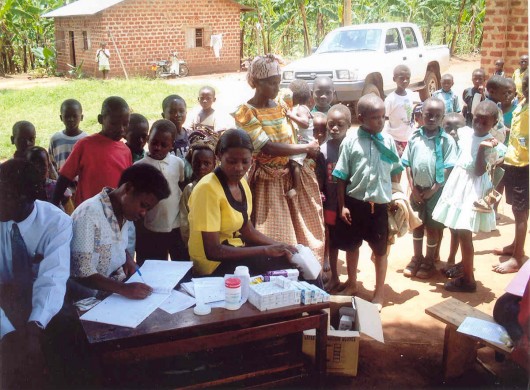Fourth day on Peds. Dr. Susan and I split the wards again today, but today I saw the sicker patients while she saw the more ambulatory ones. Of the ones I saw, malaria seems to be the cause for the more severely ill. One 4 year old boy who was admitted yesterday afternoon came in minimally responsive, almost obtunded. We’ve been treating him with IV quinine and placed an NG tube to feed him as he refused to feed and at times is too unresponsive to take anything by mouth including fluids. I wrote to repeat his malaria slide this afternoon because his original slide had >500 parasites per 200 WBC field. Most slides have anywhere from 50 – 100, sometimes 200 parasites per field. Meaning, that his parasite load was basically too high to count. If his repeat count remains high we will keep him on IV quinine rather than the usual practice of switching to oral Coartem after 3 doses of either quinine or artesunate.
By the way, peds ward only encompasses ages 29 days to 5 years old. If they are 28 days or younger, they go to NICU; if >5 years they go to adult male or female ward. Obviously children are not “little adults,” the shift to the adult wards is to prevent Peds ward from becoming too overrun. As it is Peds is the busiest ward here in the hospital, especially this time of year as it’s the rainy season and malaria is rampant.
Another if the sicker children I saw today is a 4 year old girl who also was admitted last night. The admitting physician thought she had a surgical abdomen, meaning that her belly was rigid and she could hear no bowel sounds. She also came in with malaria and a parasite load of about 200, but she is also very jaundiced (the bottom of her feet are yellow!). The surgeon was unable to see her last night, which is actually not that uncommon. Surgeons here do everything from circumcisions to C-sections to prostatic removals and all orthopedic procedures! Not to mention the usual intra-abdominal surgical cases that you would see back in the States. There’s just no other surgical specialists to help out. Anyway, by the time I saw her this morning, her abdominal pain had lessened and she had bowel sounds. She also had had a bowel movement, which was reassuring. Her fever had also resolved, but she still obviously was sick and refused to take anything by mouth. She was very restless, rolling over in bed and crying out. Her father had initially refused any further blood tests on her because she cried so much when being stuck with needles, but I was able to convince him that we needed to test her for sickle cell, hepatitis, and typhoid fever as well as obtain some liver function tests.
These finally returned late in the day. By that time I had gone by to review her again, but this time was much more worrisome. I no longer heard any bowel sounds and her abdominal pain had become specified to her right upper quadrant, where her liver and gallbladder are located. I called the surgeon and he came by about 20 minutes later. By that point, she was no longer tender in her right upper quadrant, but was continuing to cry and moan whenever you touched her legs or arms. Her liver function tests came back elevated (both gallbladder and liver tests) and he was concerned more for possible cerebral malaria causing her changes in attentiveness/alertness and the persistent crying. However, he admitted this did not explain either her jaundice or her elevated liver tests. The joint decision was to keep her on quinine for 3 more doses in case this was cerebral malaria, cover her for sepsis (a standard practice when children are diagnosed with cerebral malaria) and obtain an abdominal ultrasound tomorrow.
I have kept a running list of things necessary before coming overseas to help anyone deciding to come to Kiwoko and for my own future reference:
- You can not have too much hand sanitizer
- Loose fitting underwear is key in the tropics (to help reduce sweating and risk of itchiness, fungus in compromising places)
- Clotrimazole (see above — also for shower foot fungus)
- Shower shoes
- Cannot have too many foreign electrical outlet adapters
- Bleach (to disinfect toothbrush, wash fruits/vegetables, etc)
- Phenergan or other anti-emetic
- Cipro
- Immodium
- Enough Pepto for prophylactic doses AND treatment if needed
- Rain tops/bottom
- Drug pharmocopeia !!! (do not have instant access to Uptodate here – although the British National Formulary has been a lifesaver on the Wards, there should be an American counterpart!)
- Oxford guide to Clinical Medicine/Washington Manual
- Oxford guide to tropical disease

